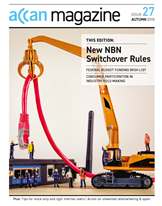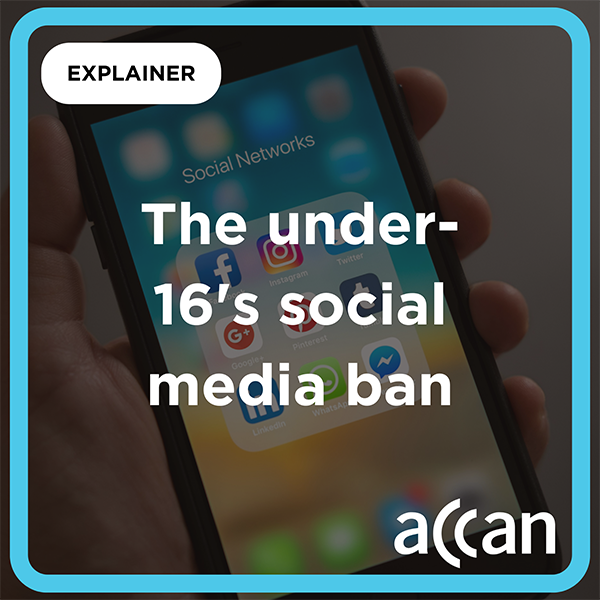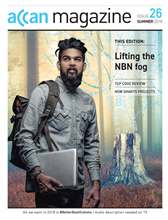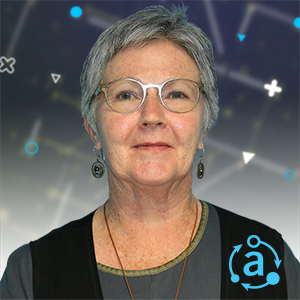Key Dates
Next Grant Round:
Applications for funding will open early 2025.
> Information about our Grants Program
Independent Grants Panel:
Results of the recent EOI will be notified Dec 2024.
> Information about our Panel
We can help: grants@accan.org.au
or phone 02 9288 4000
Subscribe to Grants Program mailings
Ask your provider if your request for service can be added to a waiting list.
Providers should keep your address and notify you when services become available in the future.

Download: ![]() ACCAN Magazine Issue 27 Autumn 20184.5 MB (Note: reading order not accessible)
ACCAN Magazine Issue 27 Autumn 20184.5 MB (Note: reading order not accessible)
Download accessible version: ![]() ACCAN Magazine Issue 27 Autumn 2018 - accessible version44.2 KB
ACCAN Magazine Issue 27 Autumn 2018 - accessible version44.2 KB
ACCAN is deeply concerned about the inadequacy of existing government programs supporting improved communications infrastructure in remote Indigenous communities (RICs). These communities are among the most disadvantaged and digitally disengaged in the country.
The pre-existing digital divide has been exacerbated by the COVID-19 lockdown. While there has been an accelerated take up of digital services such as videoconferencing, remote server access, and telehealth for those with access and skills, communities that are disconnected are at a much greater disadvantage at this time. Very few remote Indigenous people have the option of home schooling, working from home, or accessing basic services online. Most RICs have restricted all non-essential movement due to the high risks associated with COVID infection, increasing the need for remote access to services, including health, education, Centrelink, MyGov, justice, banking and so on. However, with an estimated 30% of remote and very remote Indigenous people without household access to telephony or internet, and many Shire/Council offices, schools and other service centres closed, some essential services have not been available to many remote Indigenous people.
ACCAN has today released our Priority Assistance Position statement.
Designed in consultation with consumers and other stakeholders, the Priority Assistance Position outlines consumer expectations for a new, whole of industry approach in the provision of Priority Assistance services. This new approach would see Priority Assistance services which offer consumer choice, provide robust service continuity requirements, reliable interim, or back-up services and expanded eligibility with streamlined approval procedures.

ACCANect 2021: #DigitalDownload featured a range of presentations about key topics including cyber security advice for small businesses, how Australians’ changing communications habits are driving change in the telecommunications sector, and what the digital platforms are doing to tackle misinformation.
The ACCANect 2021 #DigitalDownload is available on our Delegate Connect conference platform as Video on Demand.
The summary below outlines ACCAN’s activities from 1 September – 30 November 2022.
![]()
Desktop Computers - Australian Capital Territory
Read more: Affordable desktop computers - Australian Capital Territory
Deakin University
This project will explore how communication is defined and implications for reforms to the laws of information privacy, telecommunications surveillance, and digital markets. The team will conduct focus groups with diverse communities to enhance consumer advocacy and representation in submissions to proposed reforms and improve consumer protections.
Holly Raiche has served ACCAN as a Board member for many years. She was a member of the ACCAN Working Group (involved with establishment of ACCAN) and was the Deputy Chair of ACCAN’s Founding Board.
She is a respected communications law scholar and consumer activist who has served Australia’s communications community in national and international roles.
Holly’s contributions extend far beyond her work with ACIF, CTN and ACCAN. Through the Internet Society of Australia, she has been involved in the far wider world of internet regulation and governance.
Her ability, experience and commitment to robust analysis of communications issues has assisted ACCAN and the Board in its’ advocacy for better outcomes for consumers.
 Background
Background
The government has proposed banning Australian children under the age of 16 from using social media platforms. If passed, children would no longer be able to use platforms such as:
- X (formerly Twitter)
- TikTok
- Snapchat
Read more: The under-16’s social media ban
Write comment (0 Comments)Australia’s peak communications consumer body, ACCAN, is calling for a parliamentary inquiry into the conduct and culture of the Australian Communications and Media Authority (ACMA) following troubling revelations about its close collaboration with major telcos.
Read more: ‘Cosy’ relationship between watchdog and telcos is costly for consumers
ACCAN recently submitted to the Telecommunications Industry Ombudsman on their Member Guidance which outlines how members can appropriately signpost internal (IDR) and external dispute resolution (EDR) services to consumers.
This Roundtable will hear about current cyber security issues from leading advocates in the disability sector, as well as discussing industry and government initiatives designed to create a safer online experience. The Roundtable will identify what people with disabilities need to protect themselves online.
Read more: Cyber-Security Roundtable for People with Disabilities
Financial Counselling Australia – get in touch with a Financial Counsellor.
Debt self help tools – try this handy tool kit.
Emergency information – The ABC is Australia's official emergency broadcaster and has links to survival planning and other prevention strategies.
Telecommunications Industry Ombudsman (TIO) – The TIO is a fast, free and fair service that helps resolve telephone and internet complaints.
Financial Rights Legal Centre – some fantastic information to help you find the best help when in debt and how to avoid dodgy credit solutions.
National Children's and Youth Law Centre – a free legal service for people under the age of 25.
Some providers have special deals available for people in special circumstances. Here are the ones we've heard of.
Telstra
InContact is a free limited service that offers incoming calls but restricts outgoing calls. Telstra customer service, service difficulties and fault numbers can be called.
Telstra's prepaid calling card allows guests to make calls on a pre-paid basis, with the flexibility of being able to use the card from almost anywhere.
This aims to provide a phone service for people who seek shelter within emergency accommodation (one service only per property).
Telstra Bill Assistance Program
The program is designed to assist specific householders in maintaining access to a telephone service when difficulties arise.
CentrePay is a direct deduction facility offered by Centrelink to customers, who may choose to pay some household bills and other essential services.
Home Phone Budget offers has a line rental plan that provides a relatively lower line rental price than standard services with higher call prices. It is designed for Telstra residential customers with just one fixed line service who make very few calls.
Write comment (2 Comments)

Download: ![]() ACCAN Magazine Issue 26 Summer 20182.8 MB (Note: reading order not accessible)
ACCAN Magazine Issue 26 Summer 20182.8 MB (Note: reading order not accessible)
Download accessible version: ![]() ACCAN Magazine Issue 26 Summer 2018 - accessible version41.03 KB
ACCAN Magazine Issue 26 Summer 2018 - accessible version41.03 KB
About | Episode 1 | Episode 2 | Episode 3 | Episode 4 | Episode 5 | Episode 6
ACCANect Online

ACCANect Online provides a platform for telecommunications consumers to hear from leading voices in the telco sector about the key communications issues that are impacting consumers today and into the future. The new multi-part video series from ACCAN features presentations on the accessibility of communications services, issues relating to regional, rural and remote Australians, and digital inclusion, as well as interviews with ACCAN CEO Teresa Corbin.
Read more about the speakers below.
– Deidre O'Donnell, ACCAN Chairperson
A new report released by ACCAN today delves into young people’s experiences and issues with accessing and using phone and internet services.
We know that for many young people, phone and internet services are vital for work, study, accessing services and keeping connected with family and friends.
Our research focused on:
- The services used by young people, and their needs,
- How they navigate the market, make choices and deal with issues
- What is important to them when it comes to communications services.
Sue Salthouse AM became Chair of ACCAN following its first AGM in 2009 and she was also the chair of the ACCAN Standing Advisory Committee on Disability Issues. She was on the inaugural ACCAN Board in 2008 and completed her term at the end of 2011. Prior to that Sue worked closely with TEDICORE on many communications consumers issues. She was on the Telecommunications Consumer Representation Working Group which developed the ACCAN proposal. Sue co-ordinated the Women with Disabilities Australia (WWDA) Telecommunications Working Group and was the Chair of the Communications Alliance Disability Council. Sue has made major contributions to improving the accessibility of telecommunications for people with disabilities in Australia.
Visit Sue's ACCAN condolence page.
Australia’s current voluntary, Code-based Internet of Things (IoT) regulatory framework offers consumers minimal protection, and there are limited market-based incentives for Australian IoT device manufacturers to fill this void.
Australian consumers need an enforceable Internet of Things regulatory framework that relieves consumers of sole responsibility for their privacy and security and holds IoT device manufacturers accountable for the operation and outcomes of their products. This statement sets out key areas that ACCAN believes should be improved for an effective Australian Internet of Things regulatory regime.
The summary below outlines ACCAN’s activities from 1 June 2022 – 31 August 2022.
![]()






